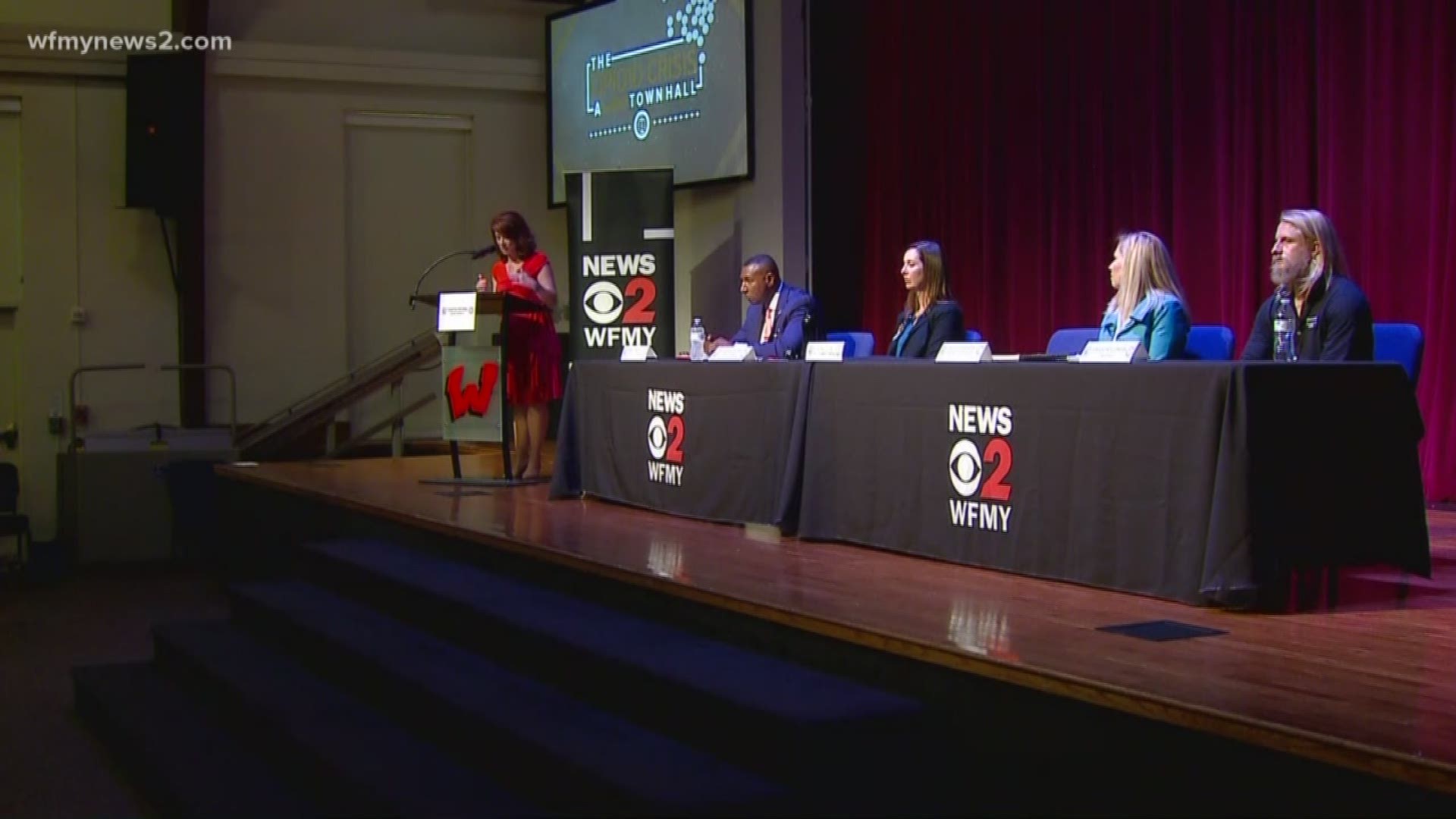HIGH POINT, N.C. — In North Carolina, five people die from opioid overdoses every day. The number of unintentional opioid overdose deaths has more than doubled in the past decade. More people die in North Carolina of an accidental drug overdose – usually, an opioid – than any other cause of accidental death, the North Carolina Attorney General's office says.
While the death toll is serious, that's not where the problem stops. The AG's office says for every overdose death in North Carolina, there were 16 emergency department visits to treat non-fatal overdoses. Hundreds of thousands of people across our state are struggling with addiction. Their families, their friends and their communities are feeling the impact.
WFMY News 2 wants you to be part of the solution to find answers. That's why we teamed up with North Carolina Attorney General, Josh Stein, for a town hall on the opioid crisis. Dozens gathered at the town hall held at Wesleyan Academy in High Point.
The panel of experts included NC Attorney General, Josh Stein, Forsyth County Sheriff, Bobby Kimbrough, GCSTOP Navigator & Recovering Addict, Chase Holleman, and Susan Stevens who lost her daughter to addiction. During the town hall, we heard from you. WFMY News 2 took questions from not just the audience but from those on Facebook.
We explored the struggle with addiction and the challenges with finding recovery. Everything from first responders providing help to an overdose to what happens with the search to find treatments and the care in hospitals.
Keep reading below to find a list of resources and a place to turn to find recovery.
Resources/More Information:
RELATED: EXCLUSIVE | A Night Near Death: 12 Hours In An Ambulance Tracking Overdoses With Paramedics
DRUG ADDICTION HOTLINES
SAMHSA’s National Helpline
The SAMHSA’s National Helpline is free, confidential, 24/7, available 365 days a year for treatment referral and information services.
Call 1-800-662-HELP (4357) or visit the online treatment locators.
National Council On Alcoholism And Drug Dependence
24-hour hotline 1-800-622-2255
More Details: National Council on Alcoholism and Drug Dependence
211 Drug Recovery Addiction Hotline
If you or someone you know has symptoms of drug addiction dial 2-1-1 from any cell phone or landline for help. This is a confidential call and you will be connected with an organization that specializes in recovery.
Another number to call 866-401-6342 is a toll-free number that is available should your service provider be unable to connect to 2-1-1.
More Details: United Way Substance Abuse Addiction Services
Triad Drug Recovery Addiction Services
Call the Alcohol and Drug Services 1-855-801-9817
SIGNS OF AN OVERDOSE
Do You Know The Signs Of An Overdose?
- Snoring or Gurgling
- Floppy arms or legs
- Blue/gray lips or fingertips
- Cannot be woken up
- Shallow, or no breathing
- No response to stimuli
Information provided by IOAD.
WHEN TO CALL AN AMBULANCE
People are often reluctant to call an ambulance for fear of police involvement or concern about the cost of a call-out. The police will only attend if there is a fatality or if their presence is requested, for example, if the ambulance crew feel threatened. This is an issue worldwide.
In addition to unconsciousness, call for emergency help when someone is:
- Having a seizure
- Experiencing severe headache
- Experiencing chest pain
- Experiencing breathing difficulties
- Extremely paranoid, agitated and/or confused
- It is not necessary for someone to have all of these signs or symptoms for them to be overdosing. Exhibiting only a few could still mean they are in trouble and need emergency help.

